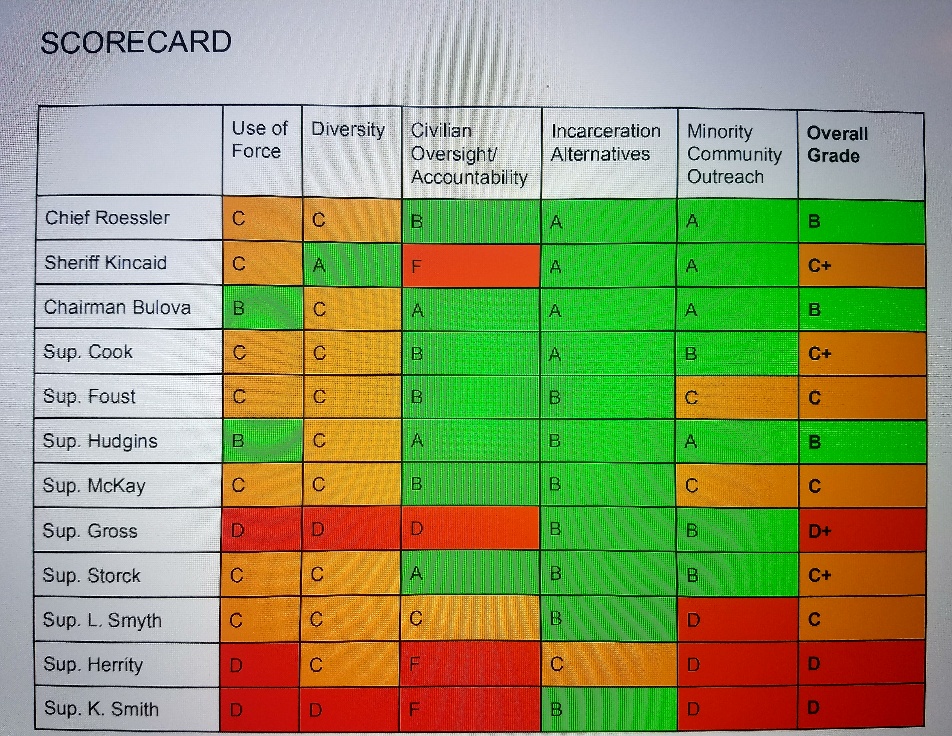 (9-22-17) The Fairfax County National Association for the Advancement of Colored People (NAACP) has issued its first-ever “report card” that grades the performance of Fairfax County’s Board of Supervisors , Sheriff Stacey Kincaid, and Police Chief Edwin C. Roessler Jr.
(9-22-17) The Fairfax County National Association for the Advancement of Colored People (NAACP) has issued its first-ever “report card” that grades the performance of Fairfax County’s Board of Supervisors , Sheriff Stacey Kincaid, and Police Chief Edwin C. Roessler Jr.
The report judged each official on five subjects: use of force by law enforcement, support for increased diversity, support for civilian oversight/accountability of the police, support of incarceration alternatives, and minority community outreach.
While the NAACP generally praised Chief Roessler, it noted that 2015 police data shows that 47% of police ‘use of force’ in Fairfax County involved African Americans and that 33% of jail inmates are black even though the African American population in the county is roughly 8%. It reported that 15% of the police force is composed of minority officers. The report found those disportionate percentages troubling.
Here’s the grades that the NAACP handed out:
A grades: None
B grades: Chairman Sharon Bulova, Chief Roessler, and Supervisor Catherine Hudgins, who is the only African American on the board.
C-plus grades: Supervisor John Cook, Sheriff Kincaid, Supervisor Dan Storck.
C grades: Supervisors: John Foust, Jeffrey McKay, Linda Smyth.
D plus grades: Supervisors Penelope A. Gross
D grades: Supervisors Pat Herrity, Kathy Smith.
Much of the grading was based on how each official has supported and helped implement recommendations that came from an Ad Hoc Police Practices Review Commission, on which I served.
This commission was created by Board Chairman Bulova to study police use of force, civilian oversight of police, treatment of persons with mental illnesses, and police diversity, the NAACP noted.
Of those issues, the NAACP said the county had done the best job implementing jail diversion of individuals with mental disorders.
Overall, however, the NAACP noted that “With a few exceptions, most county officials need to do a better job engaging with minority groups to better understand their collective concerns.”
The NAACP credited Bulova will “proactively initiating” the Ad Hoc review process and noted that Fairfax County is only “one of only two counties in the state that has a Civilian Review Panel and an Independent Police Auditor to monitor actions by the police department.”
Establishing both were controversial, the NAACP report stated: “These changes were not easy, and faced still opposition from some members of the board who either wanted to toss out the recommendations altogether or render them ineffective.”
The NAACP concluded it was still too early to judge the impact of either the panel or auditor.
Chairman Bulova created the Ad Hoc commission after the fatal police shooting of John Geer, an unarmed white man, in 2013. He was standing in the doorway of his home. The county later settled a wrongful death suit, paying $2.95 million to Geer’s two daughters. The officer, who fatally wounded Geer, was fired from the department and later indicted, marking the first time in the 75-year history of the Fairfax County Police Department that an officer faced criminal charges in connection with an on-duty shooting. In a plea deal, ex-officer Adam D. Torres, 33, served one year for committing involuntary manslaughter.
The county’s handling of the Geer case prompted community outrage that was enflamed in 2015 after sheriff’s deputies repeatedly stunned Natasha McKenna, a 37 year-old African American, who was mentally ill, while she was being removed from a jail cell. Her subsequent death from heart failure was later blamed on “excited delirium,” a highly questionable cause of death most often cited in deaths that result from excessive police force.
Although the sheriff’s office was not obligated to participate in the Ad Hoc commission, Sheriff Kincaid’s office took part. (The jail is under her supervision.) She quickly became a prime leader in pushing for creation of a Diversion First program that moves individuals, who are clearly mentally ill, into treatment instead of jail if they commit non-violent crimes.
In it’s report card, the NAACP said that Diversion First was the only recommendation among the more than 200 recommended changes by the Ad Hoc commission that received nearly unanimous support by the supervisors, the police chief and the sheriff.
Sheriff Kincaid was the only official to be given an A mark when it came to supporting diversity, all others received Cs or lower grades. All of the officials received either A or B grades when it came to supporting Diversion First (incarceration alternatives) except for Supervisor Herrity.
The report cited specific reasons for each of the grades, which you can read in the full report here.
“Much work remains to be done to implement all the recommendations of the Ad Hoc Commission: and even some of the ones that were implemented need to be bolstered either financially or from a policy perspective. The good news is that with a few exceptions, the majority of the Board of Supervisors, Chief of Police, and Sheriff generally support the reform efforts laid out by the board. The bad news is that a lot of their support is either weak or contingent on the county realizing tangible immediate financial benefits, whereas many of the biggest benefits of the changes are intangible such as improvement in civilian trust, or in other cases, it takes several years to recognize cost savings.”



